BECKETT AND DIALECTICS
ALSO AVAILABLE FROM BLOOMSBURY
Beckett, Lacan and the Mathematical Writing of the Real, Arka Chattopadhyay
Revisioning Beckett: Samuel Becketts Decadent Turn, S. E. Gontarski
Becketts Words: The Promise of Happiness in a Time of Mourning, David Kleinberg-Levin
BECKETT AND DIALECTICS
Be it Something or Nothing
EDITED BY EVA RUDA

CONTENTS
Eva Ruda |
Alain Badiou |
Mladen Dolar |
Rebecca Comay |
Eva Ruda |
Philipp Weber |
Tadej Troha |
The editor would like to thank Lucy Russell and Lisa Goodrum for their consistent enthusiasm and patience throughout the preparation of this volume, and Liza Thompson for first commissioning it. The editor would also like to acknowledge the support of the Friedrich Schlegel Graduate School of Literary Studies of Freie Universitt Berlin and the German Department of Yale University for the financing of two events that eventually led up to the composition of this volume.
Eva Ruda
The title of this volumeBeckett and Dialecticsbrings into connection two terms, namely, Beckett and Dialectics, by linking them through the means of an ordinary and. In doing so, it immediately elicits a very legitimate question: Of what nature should this supposed connection between Beckett and Dialectics be?
Two possible answers come to mind, the first of which would go as follows: The first term of the posited equation (Beckett) already implies the second one (Dialectics). In this understanding, Dialectics would be something like a theme or a structure to be looked for and found within Becketts texts. Hence the second term would only make explicit what was always already implied in the first one. Next to this logic of implication, another possible answer could adhere to a logic of addition, suggesting that the second term (Dialectics) was merely added to the first one (Beckett). With Dialectics, one would thus apply something external to Beckett, as neither Becketts individual texts nor his entire project would be of dialectical nature in themselves, but could be read by using Dialectics as a possible method of reading.
While it may seem obvious that these two possible answers represent two strictly opposing propositions as to the alleged connection between Beckett and Dialectics, it is nonetheless true that both of them are based on one fundamental common assumption. This assumption is, quite simply, that there is a relation. As antithetical as these two answers might be, they still both take it as given that, indeed, there is a relation between Beckett and Dialecticsthe only difference being that the first answer takes this relation to be an internal one, whereas the second answer conceptualizes it as external. The premise of this volume is, however, that there is a third option.
A small anecdote that may serve as an entry point into the exploration of precisely this purported third option can be found in Adornos essay Titles. Here Adorno writes that his publisher, Peter Suhrkamp, always had a particular distaste for precisely the kind of title we are dealing with. The reason for Suhrkamps idiosyncrasies [] directed against titles with the word and was his belief that as in allegorical interpretation, the and permits everything to be connected with everything else and is thus incapable of hitting the mark.guilty of relating two terms that are utterly alien to each other? Should this be the asserted third option? If the relation between Beckett and Dialectics is neither internal nor external, should the third option be that, simply put, there is no relation whatsoever?
As paradoxical as this may seem: Yes, the premise of this volume is precisely that there is no relation between Beckett and Dialecticsthe whole question being, how to understand this very concept of a relation that is not (there). To be able to answer this question, the contributions of the present volume shift the focus: In the phrase there is no relation between Beckett and Dialectics, they emphasize the there is and thus show that what we are dealing with is not a simple relation between two terms, nor is it simply not a relation between two terms. Rather we are confronted with a paradoxical third option resulting from this very dilemma namely that of an active non-relation. The German language offers a helpful prefix precisely for this peculiar kind of relation which relies on a determinate negationa prefix that, as we will see, Beckett himself made formidable use of: It is an Un-relation.
________
To make this logic graspable, we should turn to the second part of this volumes title: Be it something or nothing. In his famous German letter from 1937 to German publisher Axel Kaun, Beckett uses this formula to frame the peculiar object that contemporary literature, including his own, must aim for:
The first thing to gather from this famous quote is that language for Beckett is not simply a transparent means of communication, but rather a veil. On the one hand, this veil covers up that which lurks behind (das Dahinterkauernde, as the German original has it); it obscures and blocks the immediate access to this object. On the other hand, this veil that is language is precisely that which generates this object in the first place because, of whatever nature this behind of language may be, it can, of course, only come into existence insofar as language as its veil obscures it. This implies a peculiar temporal twist: a before language that only comes into existence retroactively, after (always already) being veiled. The object of modern literature is thus situated at a veritable material and logical (topological as much as chronological) deadlock. It is not something internal to language (since it is being veiled by it), but not something external to it either (since it is only brought into existence through the very act of its veiling); it is something inside of language that is something else than language all the while only coming into existence through language itself.
Hence there appears to be a redoubled dialectic at work in what Beckett defines as the undertaking that is literature: a dialectic between language and its peculiar object, and another one that concerns (and maybe even takes place within) this object itself; a dialectic that in its structure follows precisely the logic of Un-relation illustrated above.
The premise of the present volume is that Beckett in his project of a literature of the unwordand within the peculiar object pertaining to it. And furthermore, it is the premise of the present volume that it is precisely this peculiar object which makes dialectics tick in the first place.
________
It is against this background that the volume brings together the abovementioned two termsBeckett and Dialecticstwo terms that for a long time have been regarded as contradicting one another or even as being mutually exclusive. Beckett has repeatedly been read as a sort of anti-Dialectician, an anti-Hegel, displaying a negative teleology, in the sense that the movement of his literature worstward ho could be pitted against a supposed Hegelian teleology or theodicy of the bestward ho. The aim of the present volume is, however, to sidestep this very opposition. In doing so, its intention is neither to merely regress to positions that have long been overcome nor simply to revisit previous dialectical readings of Beckettif critical or affirmativeand to investigate them as to their continuing actuality. Rather, the aim of the present volume and the project it endorses is to resuscitate something (or nothing) from within the dialectical heritage that might offer the means for a reconfiguration and maybe a renewal of what dialectical thinking is to meanand to do this precisely by
Next page
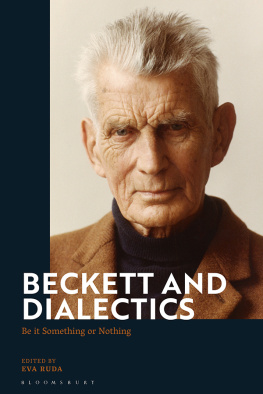

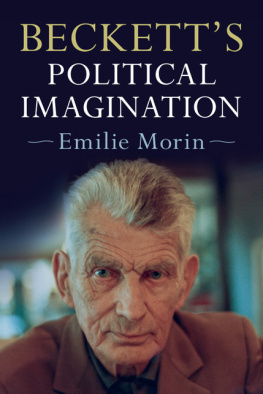
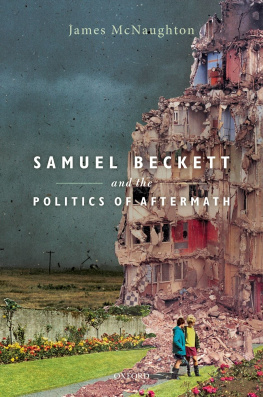
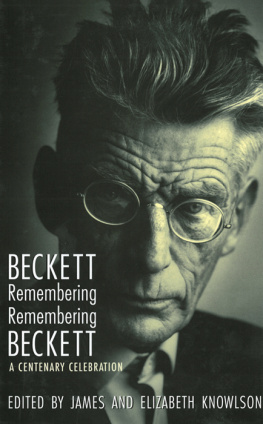
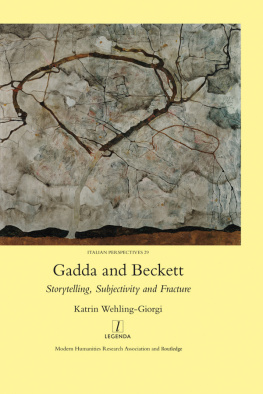
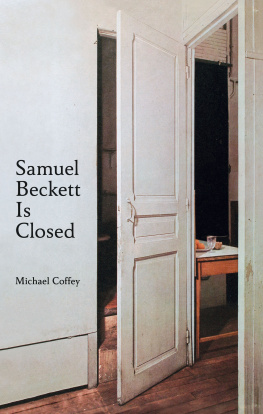
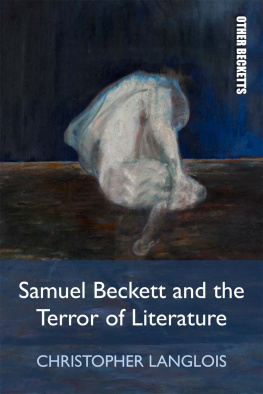
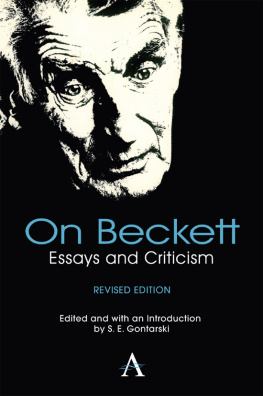
![Samuel Beckett [Samuel Beckett] - The Complete Dramatic Works](/uploads/posts/book/72751/thumbs/samuel-beckett-samuel-beckett-the-complete.jpg)

